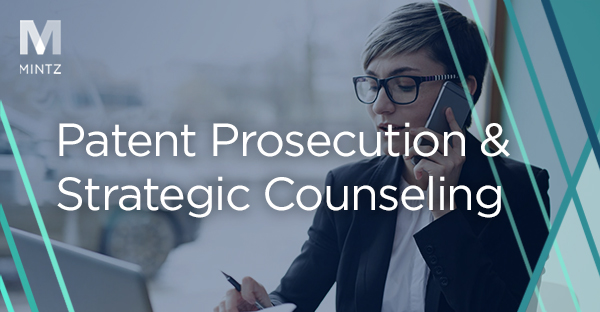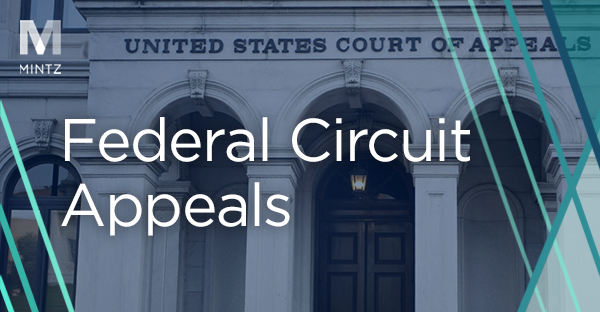
Intellectual Property
Viewpoints
Filter by:
Patent Owner Tip #10 for Surviving an Instituted IPR: Address Claim Construction and Public Availability
June 24, 2021 | Blog | By Daniel Weinger, Sean Casey
When confronted with instituted IPRs, Patent Owners should identify and exploit issues that the Petition glossed over and bring those to the attention of the Board. This will highlight for the Board important issues that the Petition failed to sufficiently address and can lead to victory for the Patent Owner.
Read more
Arthrex SCOTUS Ruling: The IPR Show Must Go On, Just with (a Bit) More Oversight
June 24, 2021 | Blog | By William Meunier, Brad M Scheller, Andrew DeVoogd
On Monday, in a highly-anticipated decision, a fractured Supreme Court issued its opinion in Arthrex v. Smith & Nephew, striking a portion of the America Invents Act (AIA) as unconstitutional—but providing an effectively toothless remedy.
Read more
Fast Track to Justice for Trade Secret Theft at the ITC: New Senate Bill Would Expand ITC Authority to Curtail Trade Secret Theft by Foreign Governments
June 23, 2021 | Blog | By Michael Renaud, Rich Gervase, Nicholas Armington
Amid the continuing threat to U.S. intellectual property rights posed by foreign actors, the International Trade Commission (ITC) is poised to become the latest federal agency to bolster protections for U.S. IP owners. The ITC’s broad power to exclude the importation into the U.S. of products that infringe American intellectual property now has the potential to be made even more robust through a new bill introduced by Senators John Cornyn (R-Tex.), Christopher Coons (D-Del.), and Todd Young (R-Ind.) on June 15, 2021, that would provide expedited relief for trade secret theft victims.
Read more
Second Circuit Provides Clarity on “Inherently Suspect” Standard, Overturns FTC’s Ruling on 1-800 Contacts Trademark Agreements
June 21, 2021 | Blog | By Evelyn French
On June 11, 2021, the U.S. Court of Appeals for the Second Circuit dismissed the Federal Trade Commission’s (FTC) administrative order against 1-800 Contacts, Inc. The Second Circuit found that the online retailer’s trademark settlements with competitor online contact lens sellers were not “inherently suspect” and, instead, should be evaluated under the traditional rule of reason analysis. The trademark settlements specified, among other things, that 1-800 Contacts’ competitors would not bid on the company’s name as a keyword in online search advertising. This ruling has significant implications for the “inherently suspect” standard—according to the Second Circuit, “courts do not have sufficient experience with this type of conduct to permit [the FTC’s] abbreviated analysis.”
Read more
Reduced Scope of March-in Rights Under Bayh Dole Rules Revisions
June 16, 2021 | Blog | By Marc Morley
The Bayh Dole Act was enacted to provide incentives to promote commercialization of federally funded inventions and was designed to capitalize on the significant government investments in small business, university research, and other non-profit institutions.
Read more
PTAB Continues Streak of IPR Denials
June 14, 2021 | Blog | By Brad M Scheller
US Patent Trial and Appeal Board (PTAB) institution denials for inter partes review (“IPR”) and other post-grant review petitions have steadily risen from 13 percent in 2012 to 44 percent in 2020. In 2020, the institution rate has fallen to 56%, down from 63% a year ago.
Read more
Patent Owner Tip #9 for Surviving an Instituted IPR: Issues Warranting Limited Additional Discovery
June 10, 2021 | Blog | By Brad M Scheller, Monique Winters Macek
In our previous post we started talking about discovery procedures in inter partes review (“IPR”) proceedings under 37 CFR § 42.51 and, in particular, the scope and timing of seeking limited additional discovery under Rule 42.51(b)(2). We reviewed timing considerations and emphasized the importance of anticipating the need for additional discovery and, to the extent necessary, moving the Board as early as possible following Institution.
Read more
Supreme Court to Consider When Inaccurate Information in a Copyright Registration Affects its Validity in Unicolors v. H&M
June 9, 2021 | Blog | By Michael Graif
After five years of litigation, the battle between Unicolors, a California-based fabric design company, and H&M is still going strong. Now the United States Supreme Court has agreed to decide whether an inaccuracy in Unicolors’ copyright registration invalidates its registration and thus a jury’s $1 million damages award in Unicolors’ favor.
Read more
PTAB Admits Mistake, Reverses, and Institutes
June 8, 2021 | Blog | By Brad M Scheller, James Thomson
In a rare turn of events the Patent Trial and Appeal Board recently granted a rehearing request in Maxlite, Inc. v. Jiaxing Super Lighting Elec. Appl. Co., Ltd., No. IPR2020-00208, Paper 14 (P.T.A.B. June 1, 2021), stating that “we abused our discretion in denying institution” based on an improper allocation of the parties’ burdens when a petitioner challenges an alleged priority date.
Read more
Failing to Adequately Support a Means-Plus-Function Claim Term Renders a Claim Invalid
June 3, 2021 | Blog | By Pedro Suarez, Joshua Berk
Claim language is important. Particularly when dealing with software systems, claims may be held invalid as being indefinite when the claim language is characterized as “means-plus-function” under pre-AIA 35 U.S.C. §112 ¶ 6 (now AIA 35 U.S.C. §112(f)).
Read more
Patent Owner Tip #8 for Surviving an Instituted IPR: Additional Discovery is Possible, but Should be Carefully Planned
May 27, 2021 | Blog | By Michael Newman, Nana Liu
Discovery procedures in inter partes review (“IPR”) proceedings, governed by 37 CFR § 42.51, are more limited in scope and timing compared to cases in district court.
Read more
How NFTs and Blockchain Secure Digital Sports Collectibles
May 24, 2021 | Blog | By Andrew D. Skale
Today, there are new opportunities to own a bit of sports history. It is now possible to even own a digital collectible of your favorite athlete making a play during a game. NFTs (non-fungible tokens) are being used to provide digital provenance that affords unique ownership of sports most memorable moments.
Read more
Patent Owner Tip #7 for Surviving an Instituted IPR: Work with Your Expert to Make the Declaration Navigable and Well Supported
May 20, 2021 | Blog | By Peter Cuomo
Expert declarations are an essential component of any patent owner’s effort to survive an instituted inter partes review (“IPR”). The Board relies heavily on expert testimony in order to evaluate and understand the technology at issue from the point of view of a person of ordinary skill in the art (“POSA”).
Read more
ITC’s New Pilot Program to Speed Investigations Merely Another Bite of the 100-Day Pilot Program Apple?
May 18, 2021 | Blog | By Daniel Weinger
Over the last decade, patent litigation has exploded at the International Trade Commission (“ITC”), which has caused the ITC to seek out ways to increase efficiency. Several years ago, the ITC introduced an early 100-Day pilot program to dispose of dispositive issues early on in investigations. While now a mainstay, the 100-Day pilot program is rarely utilized.
Read more
Patent Owner Tip #6 for Surviving an Instituted IPR: Using Objective Sources & Evidence to Support the Expert Declaration
May 13, 2021 | Blog | By William Meunier, Courtney Herndon
As we have previously discussed, expert testimony is a critical aspect of the Patent Owner’s case-in-chief of an inter partes review (“IPR”) proceeding. In addition to retaining the right expert witness and maximizing that expert’s testimony in the expert declaration, it is imperative that expert testimony is supported by objective, contemporaneous documentary evidence.
Read more
Patent Owner Tip #5 for Surviving An Instituted IPR: The Right Expert Can Save Your Patent
May 6, 2021 | Blog | By Daniel Weinger, Monique Winters Macek
The right expert can be the critical piece that saves the validity of your patent. Finding the right expert for a patent owner requires careful selection and due diligence. We previously detailed how your expert’s testimony can make or break your Patent Owner’s Response (“POR”).
Read more
Speeding Examination of Related U.S. and Japanese Patent Applications
May 3, 2021 | Blog | By Christina Sperry
It is not uncommon for applicants to file related patent applications in the United States and in Japan. When the applications claim priority to a common patent application, or one of the applications claims priority to the other, the applications’ family relationship can be used advantageously to speed prosecution in one or both jurisdictions. Multiple programs exist to expedite prosecution at the U.S. Patent and Trademark Office (USPTO) and the Japan Patent Office (JPO).
Read more
Patent Owner Tip #4 For Surviving An Instituted IPR: Take the Time to Use Your Expert as an Expert
April 29, 2021 | Blog | By Brad M Scheller, Nana Liu
The expert declaration provides a unique opportunity for Patent Owners to bolster their case during the discovery period of an inter partes review (“IPR”) proceeding. We previously detailed how to effectively use an expert declaration in the Patent Owner’s Preliminary Response (“POPR”). Now we turn to maximizing your expert’s testimony for the Patent Owner’s Response (“POR”).
Read more
Patent Owner Tip #3 for Surviving An Instituted IPR: How Patent Owner Experts Go from Zero to Hero
April 22, 2021 | Blog | By Michael Newman, Courtney Herndon
Drafting the expert declaration is another critical task for Patent Owners during the inter partes review (“IPR”) discovery period. As noted in our previous post, IPR expert witnesses provide declarations as affirmative testimony in lieu of live testimony before the Board at the hearing.
Read more
The Federal Circuit Provides New Guidance for Patent Licensees Wishing to Challenge the Licensed Patent’s Validity
April 21, 2021 | Blog | By Brad M Scheller, Peter Cuomo, Monique Winters Macek, Mark Hammond
The Federal Circuit in Apple Inc. v. Qualcomm Incorporated handed down a decision on April 7, 2021 that provides guidance on the determination of standing for patent licensees who wish to contest the validity of a patent or patents in a licensed portfolio.
Read more
Explore Other Viewpoints:
- Data Centers & Digital Infrastructure
- AI: The Washington Report
- Antitrust and Federal Regulation
- Appellate
- Arbitration, Mediation & Alternate Dispute Resolution
- Artificial Intelligence
- Awards
- Bankruptcy & Restructuring
- California Land Use
- Cannabis
- Class Action
- Complex Commercial Litigation
- Construction
- Consumer Product Safety
- Corporate Governance (ESG)
- Cross-Border Asset Recovery
- DEI Legal Developments
- Debt Financing
- Direct Investing (M&A)
- Diversity
- EB-5 Financing
- Education & Nonprofits
- Employment
- EnforceMintz
- Environmental (ESG)
- Environmental Enforcement Defense
- Environmental Law
- Environmental, Social, and Corporate Governance (ESG)
- FDA Regulatory
- FDA in Flux
- False Claims Act
- Federal Circuit Appeals
- Financial Institution Litigation
- Government Law
- Growth Equity
- Health Care
- Health Care Compliance, Fraud and Abuse, & Regulatory Counseling
- Health Care Enforcement & Investigations
- Health Care Transactions
- Health Information Privacy & Security
- IP Due Diligence
- IPRs & Other Post Grant Proceedings
- Immigration
- Impacts of a New US Administration
- Insolvency & Creditor Rights Litigation
- Institutional Investor Class Action Recovery
- Insurance & Financial Services
- Insurance Consulting & Risk Management
- Insurance and Reinsurance Problem-Solving & Dispute Resolution
- Intellectual Property
- Investment Funds
- Israel
- Licensing & Technology Transactions
- Life Sciences
- Litigation & Investigations
- M&A Litigation
- ML Strategies
- Managed Care
- Medicare, Medicaid and Commercial Coverage & Reimbursement
- Mergers & Acquisitions
- Patent Litigation
- Patent Prosecution & Strategic Counseling
- Pharmacy Benefits and PBM Contracting
- Portfolio Companies
- Privacy & Cybersecurity
- Private Client
- Private Equity
- Pro Bono
- Probate & Fiduciary Litigation
- Products Liability & Complex Tort
- Projects & Infrastructure
- Public Finance
- Real Estate Litigation
- Real Estate Transactions
- Real Estate, Construction & Infrastructure
- Retail & Consumer Products
- Securities & Capital Markets
- Securities Litigation
- Social (ESG)
- Special Purpose Acquisition Company (SPACs)
- Sports & Entertainment
- State Attorneys General
- Strategic IP Monetization & Licensing
- Sustainable Energy & Infrastructure
- Tax
- Technology
- Technology, Communications & Media
- Technology, Communications & Media Litigation
- Trade Secrets
- Trademark & Copyright
- Trademark Litigation
- Unified Patent Court (UPC)
- Value-Based Care
- Venture Capital & Emerging Companies
- White Collar Defense & Government Investigations
- Women's Health and Technology












